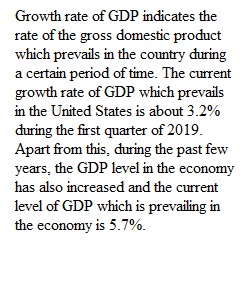


Q This discussion is a great opportunity to learn about one of the most fundamental aspects of our economy—the Gross Domestic Product (GDP). The GDP is the total value of final goods and services (output) the economy produces during a given period of time. To gain a better understanding of GDP and how countries become wealthy, please review the following informative video. • Productivity and Growth To learn about the GDP in the real world and to answer the discussion questions, follow the steps below to obtain data from the Bureau of Economic Analysis. 1. Go to bea.gov. 2. Click on the Tools tab (on the top). 3. Click on Interactive Data. 4. Click on GDP & Personal Income under National Data. 5. Click on Begin using the data. 6. Click on SECTION 1: Domestic Product and Income. 7. Click on Table 1.1.1. Percent Change from Preceding Period in Real Gross Domestic Product (A) (Q). To expand your search, click on Modify on the top middle portion of the table above the results, and then change the First Year to 2005 and the Last Year to the current year. Change the Series to Annual, and then click on Refresh Table. Note what happened before and after the recession of 2007-2008. Also, explore other tables, particularly Table 1.1.2. and Table 1.1.4, to learn about changes in prices and how and why GDP changes. • What is the current GDP growth rate? Also, examine the trend of GDP growth over the past few years. • What stage of the business cycle is the U.S. economy currently in given the trend of GDP growth? • What components of GDP tend to decline significantly during recessions (particularly during the 2008 recession), and what GDP components rise during expansion? In other words, what aspects of GDP are mostly affected when the economy slows down, and why?
View Related Questions